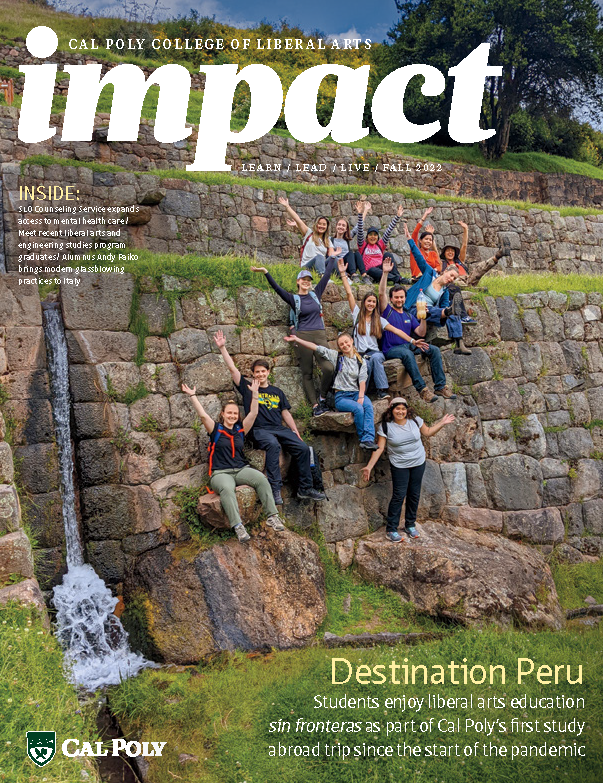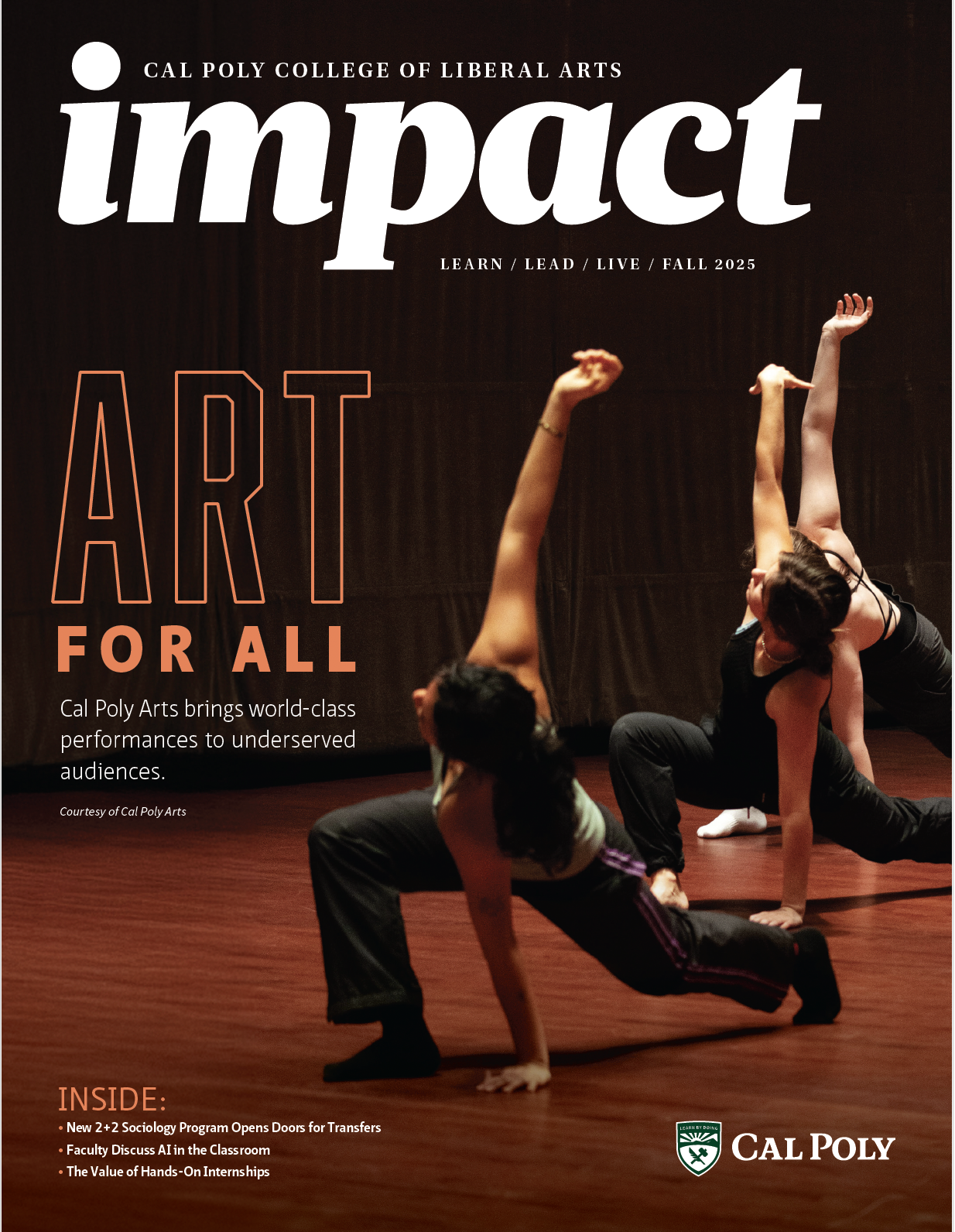Hands-On Learning Through Accessible Mental Health Care
How the Psychology and Child Development Department’s SLO Counseling Service enhanced its community support amidst the COVID-19 pandemic.

Left to right: Michele Leong, Aaron Estrada, Lisa Sweatt and Holland Boege collaborate at SLO Counseling Service.
In the spring of 2020, as the nation hastily adjusted to the COVID-19 pandemic’s “new normal,” SLO Counseling Service needed to adapt from fully in-person to fully virtual operations in less than two weeks. While the change felt disruptive at the time, offering virtual counseling significantly increased accessibility and allowed the clinic to help more clients than ever before.
Not to be confused with Cal Poly’s Campus Health and Wellbeing counseling services, SLO Counseling Service is a training clinic for graduate students in the Psychology and Child Development Department’s Master of Science program, offering counseling to both Cal Poly students and SLO county residents. Student clinicians work towards their Marriage and Family Therapy license with supervision from licensed faculty, while gaining Learn by Doing experience with assessment, diagnosis, treatment planning, and counseling with their clients.
Aaron Estrada, director of training for the Master of Science in Psychology program, noted how the switch to virtual services removed barriers for potential clients. “We saw our demand increase rather remarkably, no doubt due to desire and need for support dealing with the stress, safety concerns and unknowns of the pandemic, but also because the virtual offering of therapy expanded our access to clients who might not otherwise have been able to reach us or see us in person,” Estrada said.
“When in person, our limited space can reduce the number of people we might be able to see to three. This was not a problem when we held sessions in a virtual office space. Second, the issue of finding and paying for parking was eliminated in a virtual meeting space. While parking may be ‘only’ a few dollars, that few dollars can mean the difference of someone coming or not coming to therapy. Many of the low income, underserved community members we serve may not have the expendable income to cover the cost of parking or other transportation" Estrada said.
Lisa Sweatt, program director for the Master of Science in Psychology program, works closely with the highly competitive program’s small cohorts of exceptional graduate students.
“Entrance into our program is both highly desirable and competitive — we have received close to 200 applications in the past two years for 18 spots in our program. Over the past couple of years, I have been particularly impressed with our students’ flexibility, adaptability, creativity, and enormous empathy and compassion,” Sweatt said.
The clinic is operational year-round. Cohorts of eight graduate students work as clinicians for two quarters at a time, seeing about five clients per week and providing feedback for their peers’ therapy sessions, on top of a full course load. All sessions are recorded and evaluated by both licensed faculty and student peers to ensure the clients receive the best possible care.
Michele Leong (Master of Science Psychology ’22) recently completed her final quarter working as both a trainee clinician and a scheduling assistant in the clinic.
“Some people can be put off by us being a training clinic, but it’s actually a benefit because our clinicians have a fresh heart to care and a fresh brain to do everything that they possibly can,” Leong said. “The students’ clients are their sole focus for their education and clinical experience. We live and breathe for our clients. When we’re in class, we’re thinking about how what we’re learning applies to them, and we have hours of feedback on how we can improve. I think we offer very high-quality therapy because we have so much intention about how we can help our clients."
While the program’s workload is very demanding, students have a close-knit support network with their peers and faculty mentors. Recent alumna Holland Boege (Master of Science Psychology ’22) recalled, “As my needs and my environment were constantly changing, I had to continue to check on my self-care and how it needed to adapt to the present moment. The support of the faculty and colleagues reassuring us about how challenging our experience was gave me the courage to keep going even in difficult times.”
Having been operational for over 40 years, the SLO Counseling Service remains one of few county resources providing low-cost and free mental health services. Before the COVID-19 pandemic, services were on a sliding scale from $3 to $15 per session, but since the switch to virtual sessions, all counseling services have been offered to the public for free.
In addition to the increased physical and financial accessibility, Leong noticed that her student clients seemed more emotionally ready to share their personal experiences during virtual sessions.
“Students felt more comfortable talking about their lives from the comfort of their own space. There can be a stigma if you see someone you know when walking to the clinic and they know where and what it is," Leong said.
Graduate students’ experience providing virtual services will also make them very competitive job candidates in the future. “Pre-pandemic, our students had very high post-graduation placement for their associateships (the next level of pre-licensure training.) Our student cohorts over the past couple of years have now had the unplanned benefit of providing mental health services via telehealth…literally, Learn by Doing!” Sweatt said.
Boege remarked that “The reputation of Cal Poly has already given me other career opportunities even before graduating. Mental health clinics I have found are very familiar with Cal Poly’s program and often are seeking us out more than the other way around."
SLO Counseling Service is retaining the lessons learned from the COVID-19 pandemic and now offer a hybrid model of virtual and in-person services, which will also provide a wider range of experience to student clinicians.
“Some of our students who entered the program during the pandemic have only had the experience of counseling virtually. Now that we are in a different phase of the pandemic and students in their traineeship are beginning to do in-person work, I believe the skills they have developed and experiences they have had will only improve their post-graduation employment and career prospects,” Sweatt said.
Over the past few years, SLO Counseling Service has served about 170 clients, roughly half of them students and half residents. The program runs with a very limited budget and currently has no financial support for the graduate students who often cannot work a paying job in addition to the long hours seeing clients and completing schoolwork.
“[Our clinic] accomplishes remarkable things while operating on a shoestring budget. With greater resources, funding, and operational support, we only expect that our training experience for students and our positive impact in the community would expand and improve,” Sweatt said. “We are serving people who would have never been able to access mental health services either because of inability to afford them, or because there are not enough mental health providers in the community to meet the increased demand over the past two years. Our clinic has filled and continues to fill a critical void in mental health services in this county.”
 Download a pdf of this article or a pdf of the full IMPACT magazine.
Download a pdf of this article or a pdf of the full IMPACT magazine.

